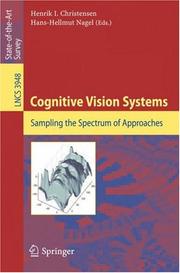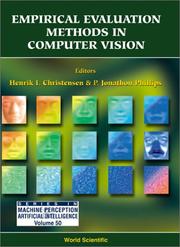| Listing 1 - 4 of 4 |
Sort by
|

ISBN: 9783540339717 354033971X 3540339728 Year: 2006 Publisher: Berlin ; New York : Springer,
Abstract | Keywords | Export | Availability | Bookmark
 Loading...
Loading...Choose an application
- Reference Manager
- EndNote
- RefWorks (Direct export to RefWorks)
During the last decade of the twentieth century, computer vision made considerable progress towards the consolidation of its fundaments, in particular regarding the treatment of geometry for the evaluation of stereo image pairs and of multi-view image recordings. Scientists thus began to look at basic computer vision solutions - irrespective of the well-perceived need to perfection these further - as components which should be explored in a larger context. This volume is a post-event proceedings volume and contains selected papers based on the presentations given, and the lively discussions that ensued, during a seminar held in Dagstuhl Castle, Germany, in October 2003. Co-sponsored by ECVision, the cognitive vision network of excellence, it was organized to further strengthen cooperation between research groups from different countries, and scientists active in related areas were invited from around the world. The 18 thoroughly revised papers presented are organized in topical sections on foundations of cognitive vision systems, recognition and categorization, learning and adaptation, representation and inference, control and systems integration, and conclusions.
Computer vision --- Cognitive science --- Vision par ordinateur --- Sciences cognitives --- Congresses. --- Congrès --- Electrical Engineering --- Applied Physics --- Technology - General --- Engineering & Applied Sciences --- Electrical & Computer Engineering --- Computer science. --- Algorithms. --- Artificial intelligence. --- Computer graphics. --- Image processing. --- Pattern recognition. --- Computer Science. --- Image Processing and Computer Vision. --- Computer Imaging, Vision, Pattern Recognition and Graphics. --- Artificial Intelligence (incl. Robotics). --- Pattern Recognition. --- Computer Graphics. --- Algorithm Analysis and Problem Complexity. --- Design perception --- Pattern recognition --- Form perception --- Perception --- Figure-ground perception --- Pictorial data processing --- Picture processing --- Processing, Image --- Imaging systems --- Optical data processing --- Automatic drafting --- Graphic data processing --- Graphics, Computer --- Computer art --- Graphic arts --- Electronic data processing --- Engineering graphics --- Image processing --- AI (Artificial intelligence) --- Artificial thinking --- Electronic brains --- Intellectronics --- Intelligence, Artificial --- Intelligent machines --- Machine intelligence --- Thinking, Artificial --- Bionics --- Digital computer simulation --- Logic machines --- Machine theory --- Self-organizing systems --- Simulation methods --- Fifth generation computers --- Neural computers --- Algorism --- Algebra --- Arithmetic --- Informatics --- Science --- Digital techniques --- Foundations --- Computer vision. --- Optical pattern recognition. --- Computer software. --- Artificial Intelligence. --- Software, Computer --- Computer systems --- Pattern perception --- Perceptrons --- Visual discrimination --- Machine vision --- Vision, Computer --- Artificial intelligence --- Pattern recognition systems --- Optical data processing. --- Optical computing --- Visual data processing --- Integrated optics --- Photonics --- Computers --- Optical equipment

ISBN: 9812777423 9789812777423 9789810249533 9810249535 9810249535 Year: 2002 Publisher: River Edge, N.J. World Scientific
Abstract | Keywords | Export | Availability | Bookmark
 Loading...
Loading...Choose an application
- Reference Manager
- EndNote
- RefWorks (Direct export to RefWorks)
This book provides comprehensive coverage of methods for the empirical evaluation of computer vision techniques. The practical use of computer vision requires empirical evaluation to ensure that the overall system has a guaranteed performance. The book contains articles that cover the design of experiments for evaluation, range image segmentation, the evaluation of face recognition and diffusion methods, image matching using correlation methods, and the performance of medical image processing algorithms. Sample Chapter(s)
Foreword (228 KB)
Chapter 1: Introduction (505 KB)
<
Book
ISBN: 3642263216 3642116930 9786612836947 1282836943 3642116949 Year: 2010 Publisher: New York : Springer,
Abstract | Keywords | Export | Availability | Bookmark
 Loading...
Loading...Choose an application
- Reference Manager
- EndNote
- RefWorks (Direct export to RefWorks)
Design of cognitive systems for assistance to people poses a major challenge to the fields of robotics and artificial intelligence. The Cognitive Systems for Cognitive Assistance (CoSy) project was organized to address the issues of i) theoretical progress on design of cognitive systems ii) methods for implementation of systems and iii) empirical studies to further understand the use and interaction with such systems. To study, design and deploy cognitive systems there is a need to considers aspects of systems design, embodiment, perception, planning and error recovery, spatial insertion, knowledge acquisition and machine learning, dialog design and human robot interaction and systems integration. The CoSy project addressed all of these aspects over a period of four years and across two different domains of application – exploration of space and task / knowledge acquisition for manipulation. The present volume documents the results of the CoSy project. The CoSy project was funded by the European Commission as part of the Cognitive Systems Program within the 6th Framework Program.
Artificial intelligence. --- Intelligent control systems. --- Machine learning. --- Computer vision. --- Machine vision --- Vision, Computer --- AI (Artificial intelligence) --- Artificial thinking --- Electronic brains --- Intellectronics --- Intelligence, Artificial --- Intelligent machines --- Machine intelligence --- Thinking, Artificial --- Engineering. --- Computer graphics. --- Statistical physics. --- Dynamical systems. --- Computational intelligence. --- Complexity, Computational. --- Cognitive psychology. --- Computational Intelligence. --- Artificial Intelligence (incl. Robotics). --- Statistical Physics, Dynamical Systems and Complexity. --- Complexity. --- Computer Imaging, Vision, Pattern Recognition and Graphics. --- Cognitive Psychology. --- Bionics --- Cognitive science --- Digital computer simulation --- Electronic data processing --- Logic machines --- Machine theory --- Self-organizing systems --- Simulation methods --- Fifth generation computers --- Neural computers --- Psychology, Cognitive --- Psychology --- Complexity, Computational --- Intelligence, Computational --- Artificial intelligence --- Soft computing --- Dynamical systems --- Kinetics --- Mathematics --- Mechanics, Analytic --- Force and energy --- Mechanics --- Physics --- Statics --- Mathematical statistics --- Automatic drafting --- Graphic data processing --- Graphics, Computer --- Computer art --- Graphic arts --- Engineering graphics --- Image processing --- Construction --- Industrial arts --- Technology --- Statistical methods --- Digital techniques --- Pattern recognition systems --- Consciousness. --- Artificial Intelligence. --- Complex Systems. --- Apperception --- Mind and body --- Perception --- Philosophy --- Spirit --- Self --- Computational complexity. --- Optical data processing. --- Optical computing --- Visual data processing --- Integrated optics --- Photonics --- Computers --- Optical equipment
Book
ISBN: 6612880465 1282880462 9786612880469 1607506130 9781607506133 9781282880467 1607506122 9781607506126 Year: 2010 Publisher: Amsterdam Washington, DC IOS Press
Abstract | Keywords | Export | Availability | Bookmark
 Loading...
Loading...Choose an application
- Reference Manager
- EndNote
- RefWorks (Direct export to RefWorks)
This volume contains the proceedings of the eleventh International Conference on Intelligent Autonomous Systems (IAS-11) at the University of Ottawa in Canada. As ever, the purpose of the IAS conference is to bring together leading international researchers with an interest in all aspects of the autonomy and adaptivity of artificial systems. This year the conference reflects in particular a current trend: the symbiotic interaction of humans with intelligent systems. Of the 35 papers submitted for this year's conference, 25 have been accepted for presentation. These papers cover a wide spectrum of research in autonomous intelligent systems including interactive systems, learning, perception, localization and mapping, navigation planning and distributed systems. This proceedings includes all the accepted papers and reflects the wide variety of topics of current concern to all those involved in the use, research and development of intelligent autonomous systems.
| Listing 1 - 4 of 4 |
Sort by
|

 Search
Search Feedback
Feedback About UniCat
About UniCat  Help
Help News
News